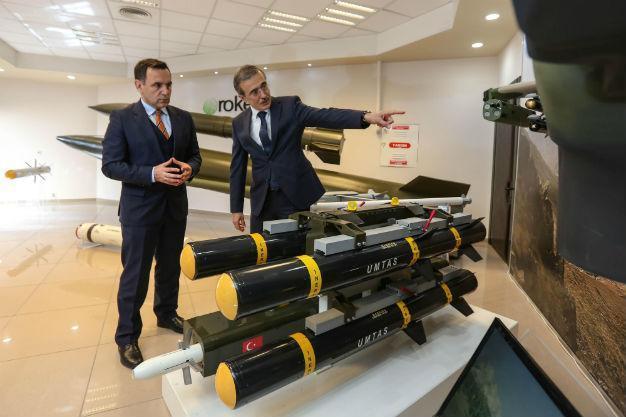Turkey needs armed drone to defend Syrian border: Official
Deniz Zeyrek - ANKARA

Katyusha rockets fired by Islamic State of Iraq and the Levant (ISIL) militants into the southeastern province of Kilis were a new threat for Turkey, according to Turkey’s top defense procurement official, who said Kilis could be protected by armed drones.
“It is difficult to detect and fight with them [rockets] technologically ahead of their firing. There are several countries which are in an active fight with such early systems, but even their systems reach partial success. The best method is to develop and have a capability that will monitor the region which is under threat and to hit this target immediately. Armed drones constitute a good example here,” said İsmail Demir, head of the Undersecretariat for Defense Industries (SSM), in an exclusive interview with daily Hürriyet at the production hub of Turkey’s Roketsan.
He noted that Turkish commanders were pleased to use local products, as they found them of high quality.
Demir said that Turkey has now reached a crucial point in terms of local defense production and aimed to make the development of several key products by 100 percent indigenous means, praising the high quality of many local defense products by Roketsan, Aselsani Havelsan, TAI and others in a complementary and integrated way.
“In the past, we tried to figure out from where we should buy our defense products. Yet we have been asking ourselves: How can we develop which product? It is of course not possible for any country to make all parts of any products. The point is to make a priority classification to determine which parts are of the most crucial… Turkey has been in urgent need of some defense products in several fields on which it has been in an active fight. Our companies are ready to meet these demands immediately. Our slogan is as following: We can make the better version of any human-made product,” he said.
“The point is here to be able to make products with the capability of destroying, monitoring and receptivity of higher quality at home. Our aim is to reach 100 percent locality in such products, as the dependability on foreign sources in these fields is always a problem. Although Turkey has been a late comer in local defense production, its sector has now reached some $15 billion project development capacity while employing more than 35,000 people,” he noted, adding that the know-how here could be used in any key sectors.
Demir noted that Turkey’s defense exports were currently around $1.67 billion, and the country’s target was to increase this figure to $25 billion in the next seven years.
He said a Turkish-made basic training aircraft called the Hürkuş, which was designed and manufactured by TAI, will be ready to be used by the Air Force by 2018, and its armed version will follow.
There is also a submarine project in the pipeline now, he noted.
Joint work with NATO ‘key’ in air defense system
Turkey will gradually develop an air defense system which will be integrated into the NATO system, said Demir, adding that joint work with NATO would accelerate the process.
In 2013, Turkey selected, over European and U.S. rivals, a Chinese contender for the construction of its first long-range air and anti-missile defense system. In November 2015 it scrapped that competition, saying two local companies would instead build the air defense system.
“We did not cancel the project, but just scrapped the bidding. We will soon enter to a new development process, in which our local companies, including Roketsan and Havelsan, will take part. We have already continued our projects to develop systems with medium, high and low ranges… We will gradually extend the ranges. As we will not make any direct acquisition, our gradually developed system will be integrated into NATO’s system. Our doors are open for any support here. We believe that any joint work with NATO will accelerate the process,” said Demir.
 Katyusha rockets fired by Islamic State of Iraq and the Levant (ISIL) militants into the southeastern province of Kilis were a new threat for Turkey, according to Turkey’s top defense procurement official, who said Kilis could be protected by armed drones.
Katyusha rockets fired by Islamic State of Iraq and the Levant (ISIL) militants into the southeastern province of Kilis were a new threat for Turkey, according to Turkey’s top defense procurement official, who said Kilis could be protected by armed drones.